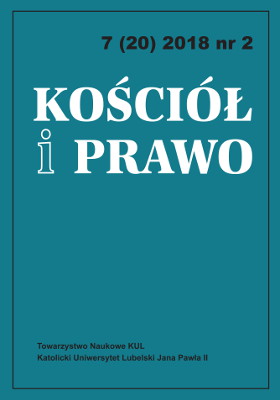Vir baptizatus podmiotem święceń diakonatu w Kodeksie Prawa Kanonicznego w ujęciu historyczno-prawnym
Vir baptizatus as the Subject of Ordination of the Diaconate in the Code of Canon Law Seen from a Historical-Legal Perspective
Author(s): Marcin BiderSubject(s): Law, Constitution, Jurisprudence, Canon Law / Church Law
Published by: Towarzystwo Naukowe KUL & Katolicki Uniwersytet Lubelski Jana Pawła II
Keywords: woman; gender; “women’s priesthood”; transsexuality; baptism; ministerial priesthood; nullity of sacred ordination
Summary/Abstract: The objective of the article is to present – in accordance withcan. 1024 of the 1983 Code of Canon Law – the canonical requirements for valid reception of the diaconate in the theological and legal perspective. In can. 1024, the legislator states that a baptized male alone can be promoted to the diaconate. The Catholic Church does not consider herself as authorized to admit women to priestly ordination, and thus to the episcopate and presbyterate. However, women in the future could be promoted to the diaconate because it does not constitute a degree of participation in the priesthood of Christ. In the future, women could be admitted to receive diaconal ordination in the case of abrogation or amendment of can. 1024. The author presents arguments from the Bible, the Tradition and the Church’s Magisterium. Theological arguments are presented in a historical perspective. The article examines issues connected with the ordination of deaconesses, the evaluation of which depends on the results of the research in historical and theological sources. Should a woman or an unbaptized man be admitted to the diaconate, it would be necessary to declare the nullity of these holy orders.
Journal: Kościół i Prawo
- Issue Year: 7/2018
- Issue No: 2
- Page Range: 79-97
- Page Count: 19
- Language: Polish

